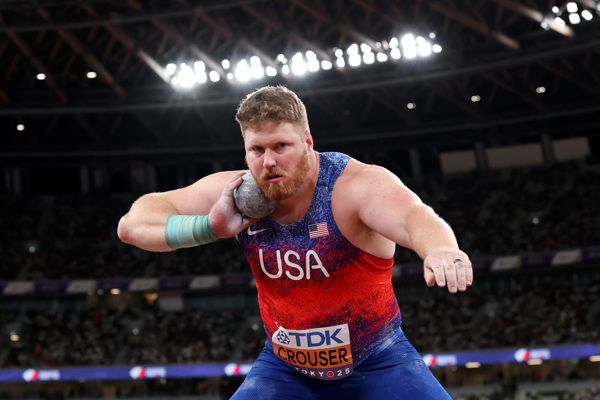Three-time Olympic champion Ryan Crouser has competed in one competition this year, after battling with a persistent elbow injury, but he still managed to find that old magic and deliver a third consecutive world title at the World Athletics Championships Tokyo 25 on Saturday (13).
Crouser, 32, joins fellow US thrower John Godina and Swiss athlete Werner Gunthor as the only men to have won three world titles in the shot put, and he may well become the only man to have four titles in Beijing in 2027, given his ability to win from any situation.
“Every championship has a different aspect to it, but this is the one I am most proud of,” he said, admitting he felt “a lot of doubt” heading into the championships.
“This is my first time throwing hard since September last year, so I really didn’t know what kind of shape I was in. It was kind of a ‘fake it until you make it’ today.”
Despite his travails this year, and his noticeable absence from the international competition circuit, Crouser returned to normal service without missing a beat.
After a first-round warm up in the final, he took control of the competition with a second-round throw of 21.99m, and never relinquished it.
In the fifth round, as his nearest competitors Leonardo Fabbri of Italy and Tom Walsh New Zealand moved within 5cm of his leading throw with matching attempts of 21.94m, Crouser responded in signature style, launching the shot out to 22.34m, the only throw over 22 metres in the competition.
The men’s shot put frequently produces final-round drama and it did again in Tokyo, as Mexico’s Uziel Munoz produced the throw of his life, a personal best of 21.97m, to upset the status quo and leap into the silver medal position.
Until that moment he was languishing in fifth position, with a best performance of 21.50m, but his last-round heroics put pressure on world silver medallist Fabbri and 2017 world champion Walsh to improve again. Neither could find those few extra centimetres, and Munoz claimed his first global medal, and the first by a Mexican in any throwing event.
“This is the result of hard work for many years,” he said. “We are paving the way for the throws in Mexico. They were forgotten and we are putting them back on the map.”
Fabbri added bronze to his silver from four years ago, defeating Walsh on a countback, and was delighted to be back on the podium after struggling in the Olympic year.
“I threw well in the first round, better in the second, but when I saw Tom throwing 21.94m, I knew I needed to throw 22 metres to win a medal,” Fabbri said. “I had a great reaction, and I am really proud of myself. I am very happy for Uziel for winning the silver medal, but I am a bit sad for Tom because he really inspires me.”
After 33-year-old Walsh took his final attempt, the amiable New Zealander bent at the waist as if he had been gut-punched as he realised that he had finished fourth for the third consecutive world championships, this time on countback.
The medallists at the 2019 World Championship in Doha were famously separated by just 1cm as Joe Kovacs (22.91m) overtook Crouser and Walsh (both 22.90m) to snatch the title.
In Eugene in 2022, Crouser had his revenge, winning by 5cm (22.94m) from Kovacs (22.89m), who was a surprise non-qualifier for the US team this year. This year, the silver and bronze medals were decided by just three centimetres.
Crouser had the luxury of being able to celebrate without taking his final throw, as he did in Budapest two years ago. His best performance was well down on his previous winning distances, and his world record of 23.56m, but it was remarkable given his poor preparation. He had already shown superior resilience last year, overcoming a similar elbow injury to win his third Olympic title in Paris, and he needed that experience to keep the faith in the absence of any other competition this year.
However, Crouser had put himself back in the medal conversation emphatically in qualification earlier in the day, by pushing his first throw in competition this year out to 21.37m to qualify automatically for the final.
Everything seemed to be going right for Walsh at that stage. He led qualifying with 21.74m on his second attempt. Using as little energy as possible on qualification was the preferred strategy, with the final to take place just 10 hours later, and Crouser once again demonstrated perfect timing when it counted most, the hallmark of the champion he is.
Nicole Jeffery for World Athletics


AloJapan.com